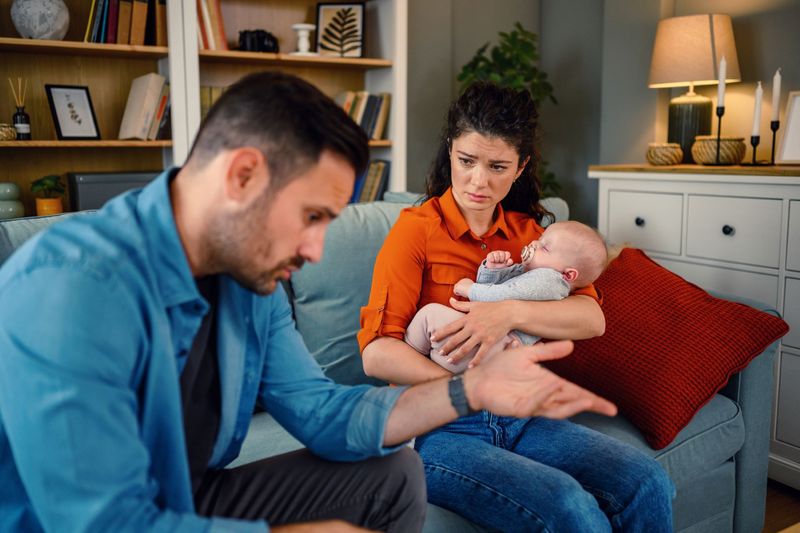Marriage is a journey, often filled with joy and challenges alike. While many couples navigate these waters successfully, certain times can heighten the risk of divorce. Understanding these moments can help couples prepare and strengthen their union.
In this blog post, we explore 17 critical periods when the risk of divorce is notably high, providing insight and empathy for couples everywhere.
1. Within the first two years of marriage
With butterflies still fluttering, the newlywed phase is often perceived as blissful. However, adjusting to shared lives and responsibilities can be daunting. A couple once shared how their first argument over finances came as a shock, shaking their romantic ideals.
These initial years require learning and adapting to each other’s habits—both endearing and bothersome. Communication becomes essential in aligning expectations and building a foundation of trust. But when misunderstandings persist, they can sow seeds of doubt.
It’s a period of exploration, where partners discover more than they expected, sometimes leading to a re-evaluation of their choice. Couples who navigate this time with patience and openness often emerge stronger.
2. After the first child is born
The arrival of a first child brings joy and sleepless nights. A mother recounts her struggle with postnatal depression, while her partner felt helpless, unable to bridge the emotional gap.
Parenthood shifts dynamics radically, with new priorities and responsibilities. Time previously spent together is diverted to caring for the infant, leaving couples feeling disconnected.
Balancing parenting with maintaining the relationship requires effort and empathy—a juggling act that can stretch patience thin. For some, the stress of adapting to these new roles without adequate support can strain the relationship, leading to misunderstandings and frustration.
3. When the last child leaves home
With the last child leaving home, a sense of emptiness fills the once bustling household. A father expressed how silence became a constant reminder of his unspoken marital issues.
This transition can evoke reflection on personal identity and the relationship’s current state. Without the distraction of children, couples may confront unresolved conflicts or feelings of disconnect.
Rekindling companionship is essential, yet rediscovering shared interests or intimacy can be challenging after years of focusing on family. Navigating this period with understanding can reignite the partnership, but neglect may widen existing rifts.
4. During major financial strain
Financial strain tests the sturdiest of partnerships. An entrepreneur revealed how his business’s downturn led to sleepless nights and tension with his spouse.
Money issues can amplify underlying problems, making everyday decisions feel burdensome. Differing spending habits or priorities might spark conflict, eroding trust and communication.
In times of financial hardship, transparent discussions about budgets and goals become crucial. Couples who collaborate to overcome financial challenges often find their bond strengthened, but persistent strain can fracture even the strongest relationships.
5. When one partner changes significantly
Change is inevitable, yet when one partner undergoes a significant transformation, whether physical, emotional, or professional, it can unsettle the relationship.
A woman shared how her journey towards self-discovery left her partner feeling excluded. Such changes can challenge the balance of the relationship, leading to feelings of inadequacy or neglect.
To sustain the union, both partners must embrace the change and communicate openly about their evolving needs. This period may uncover opportunities for growth, but unmanaged, it risks alienating one partner, causing emotional distance.
6. In the transition to retirement
Retirement marks a new chapter, full of possibilities yet fraught with adjustments. A retiree reminisced about the loss of daily structure and purpose, which strained his marriage.
Couples may struggle with newfound time together, revealing old patterns or tensions. The shift from career-driven lives to shared leisure requires redefining roles and finding mutual interests.
For some, this becomes a chance to deepen their bond, while for others, unresolved issues from years past surface, challenging the relationship’s stability. Open dialogue and shared activities can ease this transition.
7. After a betrayal of trust—big or small
Trust is the bedrock of any relationship, and when betrayed, whether through infidelity or broken promises, healing becomes arduous. A partner recounted the agony of discovering hidden debts, feeling blindsided and betrayed.
Rebuilding trust necessitates transparency, patience, and time. The journey to forgiveness and understanding can be long, fraught with emotional turmoil.
While some couples emerge with renewed commitment, others find the breach insurmountable. Addressing the root causes and seeking professional guidance can aid in navigating this challenging period.
8. When caregiving becomes one-sided
When caregiving becomes a central aspect of life, it often falls predominantly on one partner. A caregiver shared their experience of feeling overwhelmed and isolated, without respite.
The imbalance can lead to resentment and fatigue, overshadowing the relationship’s joys. The healthy partner may feel neglected or guilty, while the caregiver shoulders the burden.
Open discussions about needs and seeking external support can alleviate some pressure. Balancing caregiving with personal time and relationship nurturing is essential to prevent the emotional toll from becoming too great.
9. During major grief or loss
Grief can either bind couples together or drive them apart. A couple shared how the loss of a child tested their marriage, as each grieved differently.
Emotional support is crucial, yet individual coping mechanisms may diverge, leading to misunderstandings. The grieving process can uncover cracks in communication or emotional connection.
Finding solace in shared memories and activities while respecting each other’s grieving pace can help preserve the relationship. Professional counseling may also offer guidance in navigating this deeply personal journey.
10. When communication breaks down completely
Communication is the lifeline of a relationship. When it falters, misunderstandings pile up, creating emotional distance. A husband expressed how their dinner table turned silent, a stark contrast to their once vibrant discussions.
Without communication, assumptions and resentment fester. Couples may find themselves trapped in a cycle of blame and frustration, unable to break free.
Rekindling the dialogue requires willingness and humility. Couples counseling can facilitate this, providing tools to rebuild understanding and connection. Left unaddressed, the silence can become deafening, pushing partners further apart.
11. If expectations never match reality
Expectations versus reality can be a chasm, creating disillusionment in marriage. A couple recalled their honeymoon phase, gradually overshadowed by unmet dreams and ambitions.
When reality diverges from expectations, disappointment may ensue, leading to questioning of the relationship’s direction. Each partner’s dreams and aspirations need acknowledgment and adjustment.
Open discussions about future goals and compromise are key to bridging this gap. Acceptance and empathy can transform unrealistic expectations into shared plans and achievable goals, strengthening the connection.
12. After moving to a new city
Relocating to a new city is both thrilling and daunting. A couple described the excitement of a new beginning, quickly overshadowed by homesickness and loneliness.
Adjusting to new surroundings while managing the relationship can be challenging. The absence of familiar support systems may intensify stress and isolation.
Finding community and shared activities can ease the transition. Couples who embrace the adventure together often grow closer, but failure to adapt or support each other can strain the partnership.
13. When in-laws become too involved
In-laws can be a source of support or tension. A couple recounted how well-meaning advice from parents began to feel intrusive.
Balancing family dynamics requires setting boundaries and maintaining autonomy. When in-laws become too involved, it can lead to feelings of inadequacy or control.
Effective communication with both partners and their families is crucial. By respecting boundaries and fostering independence, couples can maintain harmony and focus on their own relationship.
14. When roles shift but support doesn’t
Life’s demands can shift roles within a relationship, bringing about stress and imbalance. A partner shared the challenge of transitioning from a homemaker to the primary breadwinner, feeling unsupported.
Role changes require mutual support and understanding. Without adaptation, resentment may build as one partner feels undervalued or overwhelmed.
Promoting equity and shared responsibilities can alleviate tension. Open dialogue about evolving roles ensures both partners feel appreciated and understood, fostering a healthier relationship.
15. After a long illness
Long-term illness tests emotional and physical resilience. A survivor shared the relief of recovery tinged with lingering exhaustion and uncertainty.
The caregiving journey may leave emotional scars, affecting both partners. Roles often shift, altering the relationship’s dynamics.
Rebuilding requires patience and open communication about each other’s needs and fears. Celebrating small victories and nurturing the bond through shared experiences can facilitate healing and reconnection.
16. When resentment builds without release
Resentment, when unaddressed, can quietly erode a relationship. A partner reflected on unspoken grievances that accumulated over years, creating an invisible wall.
Resentment often stems from unmet needs or perceived slights. Without expression, it festers, leading to emotional distance and conflict.
Addressing underlying issues through honest dialogue is essential. Couples may find relief in expressing feelings constructively, allowing healing and reconciliation. Professional guidance can aid in breaking down barriers and fostering a renewed connection.
17. During emotional disconnection over time
Emotional disconnection often creeps in slowly. A couple shared how their once vibrant exchanges dwindled into routine pleasantries.
Over time, partners may drift apart, focusing on individual routines rather than shared experiences. This distance can breed loneliness even within the relationship.
Rekindling emotional intimacy requires intentional effort. Sharing interests, engaging in meaningful conversations, and prioritizing time together can revive the connection. Couples who invest in rebuilding their emotional bond often rediscover the joy in their partnership.


















